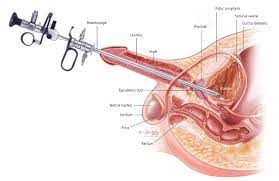What is Bladder Cancer?
Bladder cancer refers to the uncontrolled growth of abnormal cells in the bladder lining, which can invade deeper muscle layers or spread to other parts of the body. Early detection plays a crucial role in effective treatment, often involving surgery to remove the cancerous tissue.
Types of Bladder Cancer:
- Transitional Cell Carcinoma (TCC): Most common type, originating in the bladder’s inner lining.
- Squamous Cell Carcinoma: Often caused by chronic irritation or infections.
- Adenocarcinoma: Rare type that begins in mucus-secreting glands of the bladder.
When is Bladder Cancer Surgery Recommended?
Bladder cancer surgery is typically recommended in the following cases:
- Early-stage bladder cancer requiring tumor removal.
- Muscle-invasive bladder cancer where deeper tissues are affected.
- Recurrent bladder cancer.
- Advanced cancer cases needing complete bladder removal and reconstruction.
Types of Bladder Cancer Surgeries
- Transurethral Resection of Bladder Tumor (TURBT):
- Minimally invasive procedure.
- Removes tumors from the bladder lining using a resectoscope inserted through the urethra.
- Typically used for early-stage bladder cancer.
- Often combined with chemotherapy or immunotherapy to prevent recurrence.
- Partial Cystectomy:
- Involves removal of a portion of the bladder where the tumor is located.
- Preserves bladder functionality.
- Best suited for localized cancer in specific areas of the bladder.
- Radical Cystectomy:
- Complete removal of the bladder, nearby lymph nodes, and surrounding tissues.
- In men, this may include the prostate and seminal vesicles.
- In women, it may involve the removal of the uterus, ovaries, and part of the vagina.
- Reconstructive Surgery:
- Neobladder Reconstruction: Creates a new bladder using intestinal tissue, allowing natural urination.
- Ileal Conduit: Diverts urine to an external pouch through an opening in the abdomen.
- Continent Urinary Reservoir: Internal urine storage created from a section of the intestine.
- Robotic-Assisted Surgery:
- Performed with robotic systems for enhanced precision.
- Minimally invasive with faster recovery times and fewer complications.
Symptoms Indicating the Need for Surgery
- Persistent blood in the urine (hematuria).
- Increased frequency or urgency to urinate.
- Painful urination or lower abdominal discomfort.
- Recurrent urinary tract infections.
- Unexplained weight loss or fatigue.
The Bladder Cancer Surgery Process
1. Pre-Surgery:
- Detailed imaging tests like CT scans, MRIs, and PET scans to evaluate cancer staging.
- Blood work and physical examinations to ensure fitness for surgery.
- Consultation with a multidisciplinary team to decide the best surgical approach.
2. During Surgery:
- General anesthesia is administered.
- Tumor or bladder removal is performed as per the chosen procedure.
- Reconstruction (if needed) is completed during the same session.
3. Post-Surgery:
- Monitoring in a hospital setting for 3-10 days.
- Post-operative care plans include medications, a catheter for urine drainage, and dietary guidelines.
- Follow-up visits for early detection of recurrence.
Advanced Techniques in Bladder Cancer Treatment
- Intravesical Chemotherapy: Delivers medication directly into the bladder to kill remaining cancer cells post-TURBT.
- Immunotherapy: Techniques like Bacillus Calmette-Guerin (BCG) therapy to boost the immune system and prevent recurrence.
- Molecular Imaging: Advanced imaging to detect cancer spread and guide surgery.
- Precision Oncology: Personalized treatments based on the genetic profile of the tumor.
Why Choose India for Bladder Cancer Surgery?
- State-of-the-Art Facilities: Equipped with cutting-edge robotic and minimally invasive surgical technologies.
- Experienced Specialists: Globally trained surgeons with extensive expertise in urologic oncology.
- Affordable Costs: Bladder cancer treatment costs in India are 60-80% lower than in Western countries.
- Comprehensive Care: Hospitals provide end-to-end care, including advanced imaging, surgery, and post-operative management.
- Fast-Track Appointments: Minimal waiting times for diagnosis and surgery.
Why Choose Healtour Solutions?
- Direct access to India’s leading cancer care hospitals and surgeons.
- End-to-end support, from travel arrangements to post-treatment care.
- Customized treatment plans tailored to patient needs.
- Transparent pricing and no hidden charges.
- 24/7 multilingual support for international patients.
Benefits of Bladder Cancer Surgery in India
- Successful removal of cancerous tissue with minimal side effects.
- High-quality medical care at globally accredited hospitals.
- Faster recovery with advanced surgical methods.
- Comprehensive pre- and post-operative care.
- Significant cost savings compared to other countries.
Post-Surgery Care Guidelines
- Diet: Follow a balanced diet to promote healing and prevent infections.
- Medications: Take prescribed antibiotics and pain relief medications.
- Physical Activity: Begin light exercises as recommended by your doctor.
- Hygiene: Proper care of surgical incisions and catheters to avoid complications.
- Follow-Up: Regular monitoring and imaging tests to check for recurrence.
FAQs
- What are the common risks of bladder cancer surgery?
Risks include infection, bleeding, or urinary dysfunction, which are minimized with expert care. - How long is the hospital stay after bladder cancer surgery?
The average stay ranges from 3 to 10 days, depending on the surgery type. - Can I live a normal life without a bladder?
Yes, with alternatives like a neobladder or ileal conduit, patients can lead fulfilling lives. - How soon can I resume daily activities post-surgery?
Light activities can begin within 4 weeks, but full recovery may take 6-8 weeks. - Is robotic-assisted surgery better for bladder cancer?
Yes, robotic surgery offers precision, faster recovery, and fewer complications. - Will I need chemotherapy or radiation after surgery?
Additional treatments may be recommended based on the cancer stage and type. - What is the survival rate after bladder cancer surgery?
Early-stage surgeries have a 5-year survival rate of over 90%. - How do I prepare for bladder cancer surgery?
Follow dietary restrictions, complete pre-surgery tests, and arrange post-operative care. - Are Indian hospitals equipped for complex cancer surgeries?
Yes, many Indian hospitals are internationally accredited and offer cutting-edge treatments. - How does Healtour Solutions simplify the treatment process?
Healtour Solutions manages hospital selection, travel, visa, accommodation, and post-treatment care, ensuring a hassle-free experience.



